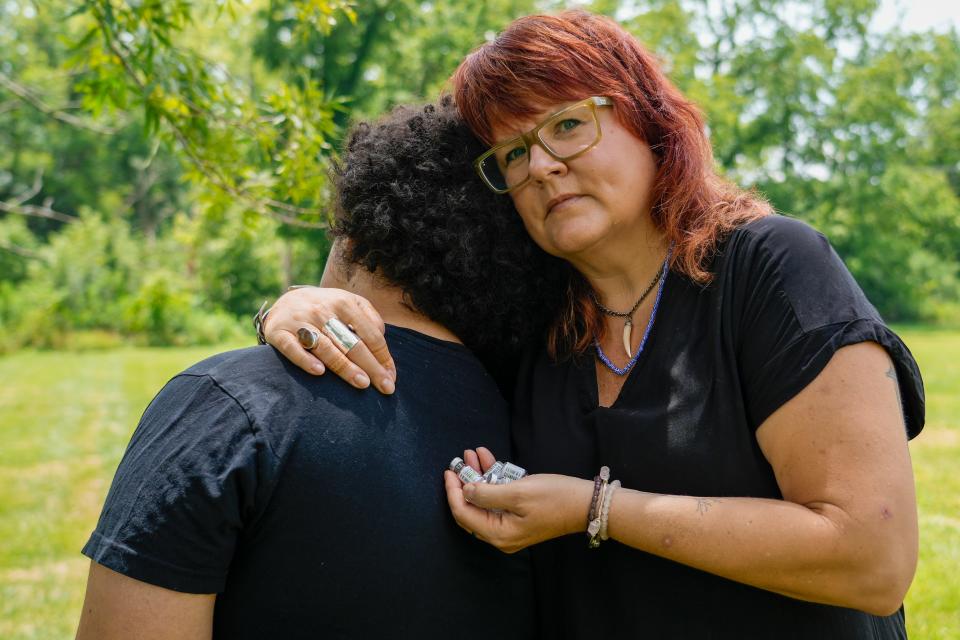Stock up on hormones? Leave? Trans teens face new Kentucky law limiting treatment

Shortly after Leo Figgs and his mother found out Kentucky lawmakers passed one of the most restrictive transgender laws in the country, they got a call from a number they didn't recognize. It was Leo's doctor calling on what the Lexington family said was an "untraceable" phone.
Stock up on testosterone, the doctor told them, before it's too late.
Meanwhile, a Fort Thomas teen has transferred to a boarding school in Michigan, out of reach from the limitations imposed by the Kentucky law.
They're among about 300,000 transgender teens in the United States, according to the Williams Institute. But unlike most others, they've had to plan how to deal with a new Kentucky law that requires minors in schools to use bathrooms that to not match their gender identity, allows teachers to use pronouns to which the student objects, and prevents minors from getting gender-affirming care, which includes puberty blockers and hormones, among other restrictions.
The law was passed in March, with the Republican-controlled legislature easily overriding a veto from Democrat Gov. Andy Beshear.

It's one of a wave anti-transgender laws nationwide. This year alone in the United States, 78 bills targeting LGBTQ rights have been signed into law of almost 500 introduced by lawmakers, according to the American Civil Liberties Union.
But for transgender minors and their families, gender identity isn't a political platform. It's their lives and they're navigating how to live them while people they don't know legislate them. That means stocking up on hormones, attending schools in another state, and considering moving out of Kentucky to find safer communities.
'I do not have the same rights'
Corio's mom was worried about repercussions at her job in education if she shared her name publicly, so she requested to remain anonymous. She was also worried about the safety of her child, who is using only their first name in this article.
They both knew what was coming for transgender youth in Kentucky before the new law was passed.
The Fort Thomas 17-year-old and family watched Northern Kentucky state Rep. Savannah Maddox, R-Dry Ridge, introduce legislation four times to ban gender-affirming care for minors. Maddox represents Grant and Gallatin counties, along with parts of nearby Boone and Kenton counties.
Corio and their mom saw similar bills introduced in Tennessee and other states over the past few years. It was only a matter of time, they both knew, before Kentucky would regulate where Corio could use the bathroom and what their medical care options could be.
Corio is nonbinary, meaning they do not strongly identify with being male or female. It's an identity that falls under the transgender umbrella because they do not identify with the gender they were assigned at birth and use they/them pronouns.
After one year at a Northern Kentucky high school, Corio transferred to a boarding school in Michigan — the Interlochen Center for the Arts. The family made the choice to pull money out of Corio's college fund to pay the expense. It costs $73,200 annually to board and attend, though the family pays about $35,000 due to scholarships. That means they all will have to figure out a different way to pay for Corio's college. But it's worth it for the family.
During Corio's freshman year at a Northern Kentucky high school, they were supported by faculty and administration. They said they experienced some teasing from classmates, but the real pushback came from parents.
At one point a parent approached Corio's mom to tell her Corio was using the boys' restroom at school. That wasn't true. The two of them had decided it wasn't safe for the 5-foot-tall, 100-pound freshman to use the boys' restroom at school.

But the fact that adults were trying to keep tabs on where her child was using the bathroom was what pushed Corio's family to invest in a safer, more accepting school option.
Corio enthusiastically started at the boarding school last year, where they have a large community of LGBTQ friends, unlike in Kentucky. The new law aimed at transgender minors was introduced and signed into law about seven months later.
"Honest to God, I thought about World War II and Londoners — how people would send the children up north to avoid the bombings. ... They sent those kids to the Lake District in the UK," Corio's mom said.
"Interlochen is my Lake District," Corio added about the safe haven.
Corio socially transitioned into being a male during the pandemic, using he/him pronouns. They later decided being nonbinary worked better for them because they don't feel like they are male or female.
Corio's mom knows that while her child's transition doesn't involve medication, if Corio had come out as a young child, they both would have wanted to consider all the medical choices available to them.
"I'm also angry that they took away my rights as a parent. I do not have the same rights as other parents in Kentucky to make medical decisions for my child," she said.
For Corio, the anti-transgender rhetoric and laws in the state means they don't plan on living in Kentucky full-time ever again.
"I don't want to live in a place where they're actively targeting my community," they said.
'We're not going to be collateral damage'
Leo Figgs has been presenting as a boy since he was about 8 years old and came out as trans when he was 12. He's been on puberty blockers or testosterone for years. His short hair and masculine clothes let him fly under the radar at school. A lot of people don't even know he's transgender.
When his doctor called the family after the state law passed, it hadn't gone into effect yet. Regardless, the doctor still wrote a testosterone prescription to last Leo over a year.
Nationwide, testosterone can already be a difficult prescription to get. It's a Schedule III controlled substance, according to the U.S. Food and Drug Administration, and insurance coverage can be limited to a few months or prescriptions at a time. The drug can also be on backorder and injection supplies can require a separate prescription.

The new limitations on hormones in the state affect more than transgender minors. It also affects minors who would otherwise need a prescription for hypogonadism, endometriosis and other medical conditions.
"We've chased testosterone to several pharmacies" throughout Lexington, Amy Figgs said.
In this instance, Figgs went to several pharmacies before thinking to get the prescription filled in bulk at Costco. There, the family was able to get enough testosterone — 10 milliliters — which will last them 40 weeks.
Leo said new restrictions on medical care are harmful to a population of teens who are likely already distressed about their identity.
"They're already struggling with the idea of coming out and being trans and then this happens. And now they legally pretty much can't (seek treatment)," Leo said.
At school, his gender is still officially marked as female but not all of his teachers have noticed. They call out his name on the first day of school, take a look at him with his short curly hair and baggy clothes, and move on, Leo said.
Leo and his mom said there weren't any conversations with the school district in the weeks leading up to the start of classes and the first few days of school have been uneventful.
So, for his senior year, he's going to just keep doing what he's been doing for years — using the bathroom he's always used (though he doesn't often use the restroom at school) and telling teachers what he is called by friends and family.
And if the new law changes all that?
"I think that we will have to find a school (college) in a safe state, and then I will follow him there so that he always has a home in a safe state, as well," Amy Figgs said. "I understand things could get better — and things will probably get better — but we're not going to be collateral damage in the interim for that."
This article originally appeared on Cincinnati Enquirer: How trans youth in Kentucky are trying to navigate new law

